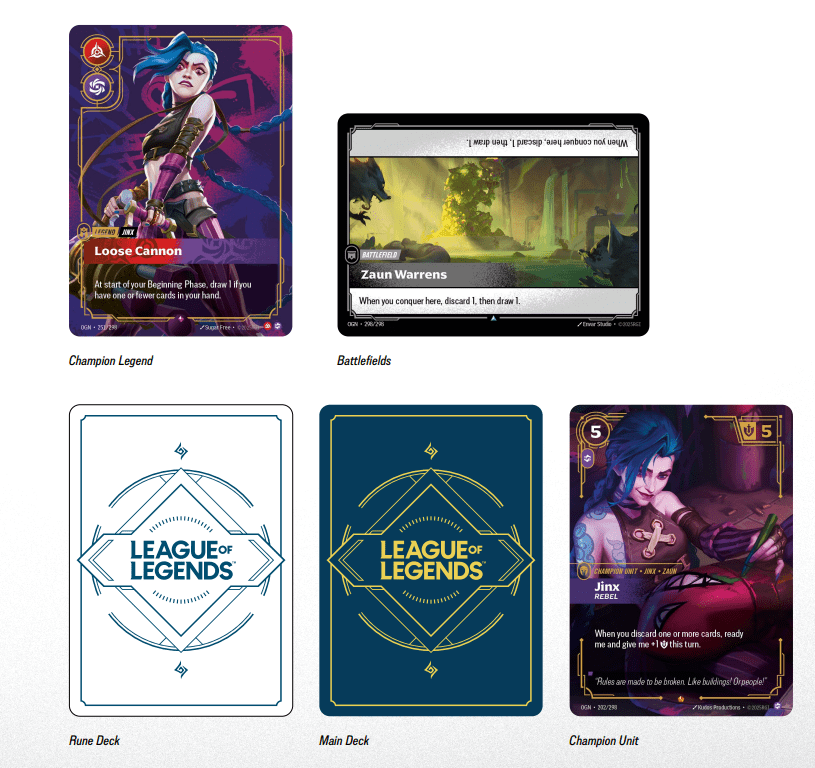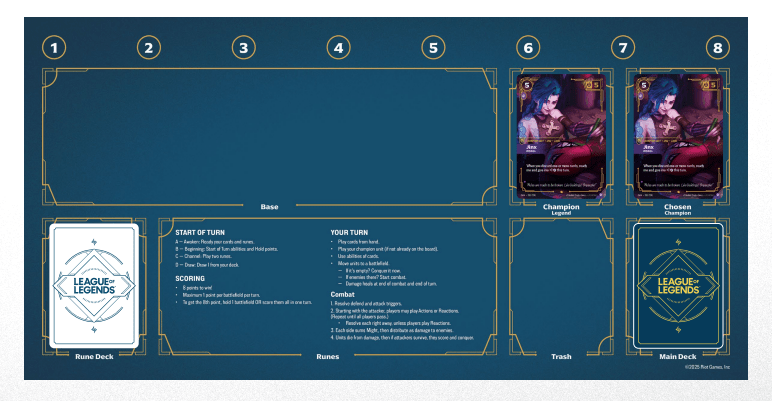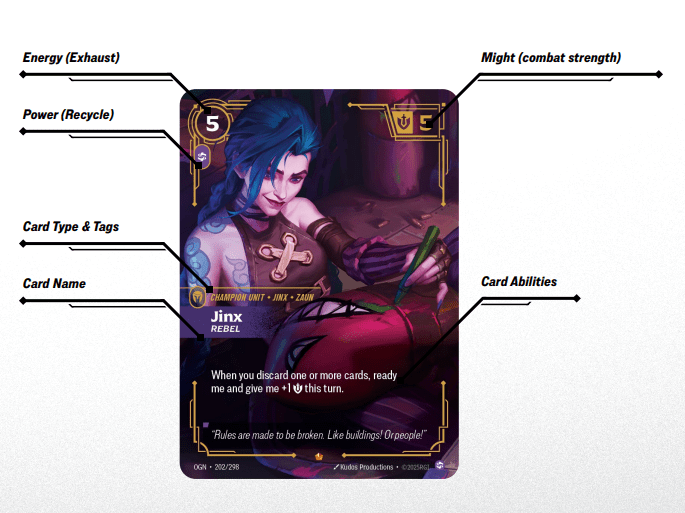If you’ve been eyeing Riftbound, Riot’s upcoming League of Legends trading card game, you’ve probably seen people call it fast, tactical, and surprisingly easy to learn. After getting our hands on the full “How to Play” guide, we can confirm—it really is. But it also hides a lot of strategic depth once you get past the basics.
(Quick commercial break before we proceed! Want the best connection when streaming or gaming online? Check out PLDT Home!)
So here’s a simplified walkthrough of how Riftbound plays, based on the official materials Riot has released.
Getting Set Up: Legends, Champions, and Battlefields
Each player starts with a Legend card that defines your deck’s identity—sort of like your faction or alignment—and a matching Champion unit that serves as your on-board leader. Your deck must follow the color identity of your Legend, and you can have up to three copies of any given card.

You’ll also need two decks: your main deck of 55 cards and a separate Rune deck with 12 cards. The Rune deck is key—it fuels all your plays during the game and acts like your resource system.
For a 1v1 match, both players choose two Battlefields. These are the spaces you’ll fight over. In multiplayer games, three Battlefields are used to accommodate the chaos of 3- or 4-player showdowns. Once decks are shuffled and drawn, and Battlefields chosen, you’re ready to go.
How a Turn Works
Turn flow in Riftbound is simple but rewarding. At the start of each turn, you resolve any effects that trigger at the beginning. Then you gain one point for each Battlefield you control without a contesting unit on it. After that, all your cards ready (i.e., untap or refresh), and you “channel” two Runes—adding two cards from your Rune deck to your pool of available resources. Finally, you draw a card and then take your actions.

Those actions include summoning units, playing spells, or moving characters to Battlefields to fight. There are no rigid phases for combat or main actions—if it’s your turn, you can just play cards and make moves in whatever order makes sense for your strategy.
It’s also worth noting that the first player in the game gets a slight handicap: they draw and channel fewer resources than the second player to balance out the advantage of going first.
Playing Units, Spells, and Hidden Cards
To play a unit, you need to spend Rune cards that match its color and cost. Units enter play in an exhausted (tapped) state, and can either sit in your home base or jump straight into one of the Battlefields you control. Your Champion unit starts the game in play and acts like a persistent, central piece of your strategy.

Spells come in two types: action spells and reaction spells. Action spells are played during your own turn, while reaction spells can be used to respond to what your opponent is doing, like interrupting a summon or countering a spell during combat. Paying for spells works the same way as units—you exhaust the correct amount and color of Runes.
Then there are Hidden cards, which are a fun twist: you place them face-down on a Battlefield you control, and they trigger automatically during a Showdown (combat). You don’t need to pay again when they trigger, but if you lose control of that Battlefield before they activate, they’re discarded.
Showdowns: Where the Game Gets Spicy
Combat in Riftbound is called a Showdown, and it triggers when a unit moves into a Battlefield already occupied by an opponent. The defending player acts first, and both players can respond with spells or Hidden cards before battle is resolved.
At the core of each Showdown is a Might comparison. Both sides add up the total Might of their participating units, plus any boosts from spells or effects. The side with the higher total wins. However, even if you win, your units still take damage—and if any unit takes damage equal to or greater than its health, it dies.
The result of a Showdown determines who controls the Battlefield. If you win a Showdown on an empty Battlefield, you conquer it. If you already controlled the Battlefield and win again, you simply hold it. These distinctions are important because they tie directly into how you win the game.
Scoring and Victory
You win a game of Riftbound by scoring 8 points. You earn points in two ways: conquering Battlefields (by winning Showdowns) and holding them uncontested at the start of your turn. It’s a tug-of-war over territory, and it rewards players who stay aggressive and mindful of board positioning.
But there’s one twist—you must be holding at least one Battlefield at the moment you reach 8 points to claim victory. So you can’t just stall and win on passive points—you have to fight for it.
Multiplayer Mayhem
Riftbound shines in 1v1, but it’s clear that Riot designed it with multiplayer in mind. In a 3- or 4-player game, things get wild: you can call for help during a Showdown and invite allies to jump into battle with you. Deals, betrayals, and swingy plays become the norm.
The fact that the game runs quickly—no rigid phases, no separate battle steps—means that multiplayer doesn’t drag the way some card games do. It’s fast, fluid, and chaotic in the best way.
A New Kind of Card Game
What makes Riftbound stand out isn’t just its League of Legends theme or its sleek visuals. It’s the way the game blends a light, accessible turn structure with rich tactical decision-making. The Rune system gives you steady resources, but also makes you think about color identity and sequencing. The Showdown system feels immediate and tense, with meaningful player interaction. And the Legend + Champion pairing lets you build a deck that actually feels like your deck.
If you’ve played Magic, Lorcana, or even Legends of Runeterra before, Riftbound will feel familiar—but different enough to keep you hooked.
Check out our other TCG articles!
Read More:
MTG x Final Fantasy – What Every New Player Should Know – VRSUS
Riftbound is Riot’s Next Big Power Play and It’s Aimed Right at the Heart of the TCG World – VRSUS
Our Board Game Picks From All aBoard Expo 2025 – VRSUS
Important Tips I Learned About Lorcana Sealed During The Reign of Jafar Prerelease – VRSUS





